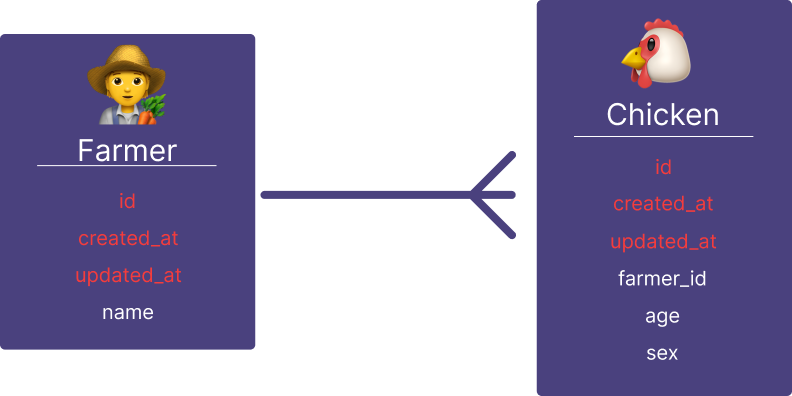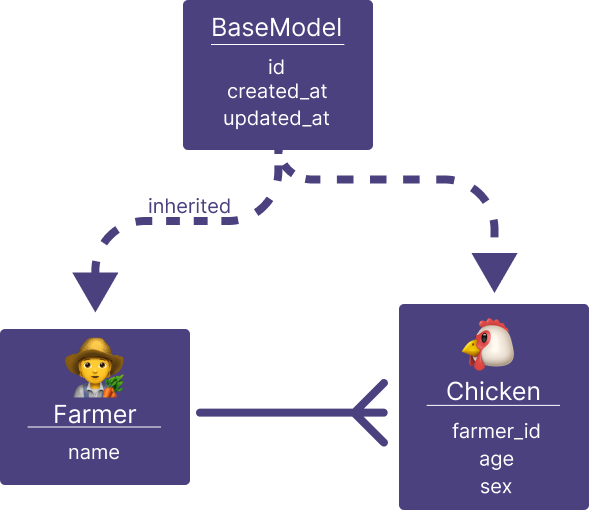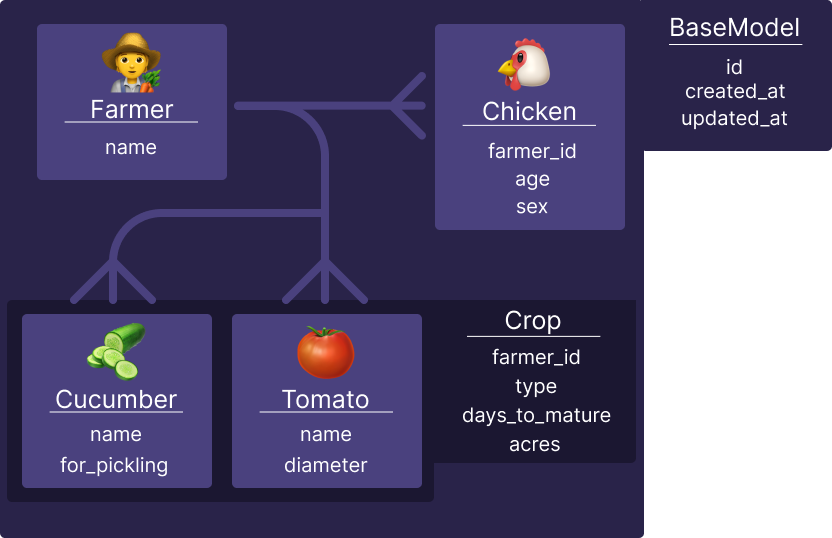Lead Author: Gavyn
Co-Authors: Lucas, Andrew
Associated Repository: blog-dry_api_flask_demo
☔️ When it starts to rain
When working with a traditional Model/View/Controller approach, it is easy to fall suspect to code duplication. I've seen it with coworkers, friends, and even family. No one is safe from code duplication. However, there are some tips and tricks you can use with Flask to help protect yourself and your loved ones.
Data Sources
First, let's talk about where data comes from and how it can trick us into making the same models multiple times.
Database + SQLAlchemy
The main source of data in most backends is a database (it's in the name). If you've been around the block and done more than a few python APIs, you're probably familiar with tools like Flask and SQLAlchemy. SQLAlchemy is great to help you model and manage data in your database without ever writing a line of SQL, and that's every developer's dream.
When working with Flask and SQLAlchemy, you'll often see ORM models like this:
class Farmer(db.Model):
id: Mapped[int] = mapped_column(
Integer, primary_key=True,
)
created_at: Mapped[DateTime] = mapped_column(
DateTime, nullable=False, server_default=func.now(),
)
updated_at: Mapped[DateTime] = mapped_column(
DateTime, nullable=False, server_default=func.now(), onupdate=func.now(),
)
name: Mapped[str] = mapped_column(
String, nullable=False,
)
And this is great! You've got an abstraction of the columns in your farmer table. Not only can you read, create,
update, and delete your farmers from your database with ease, but you can also make changes to the table itself, and
SQLAlchemy will help you migrate your data. Very developer friendly and very useful!
APIs + Marshmallow
The next source of data in any API backend is the APIs themselves! You've got two categories of data: requests and responses. In many cases, developers follow a model/view/controller pattern, and the GET routes are returning something nearly identical to the ORM model.
Let's extend our example:
farmers_bp = APIBlueprint(
"farmers", __name__, enable_openapi=True
)
# Marshmallow Schema
class FarmerOut(Schema):
id = fields.Integer(required=True)
created_at = fields.DateTime(required=True)
updated_at = fields.DateTime(required=True)
name = fields.String(required=True)
# Flask Route
@farmers_bp.get("/<int:farmer_id>")
@farmers_bp.output(FarmerOut)
def get_farmer_by_id(farmer_id: int):
farmer = Farmer.query.where(Farmer.id == farmer_id).first()
if farmer is None:
raise HTTPError(404, message="Farmer not found")
return farmer
Now if there exists a record in our database, we can ping farmers/1 and get the following response:
{
"created_at": "2023-12-12T15:51:00",
"id": 1,
"name": "Old MacDonald",
"updated_at": "2023-12-12T15:51:00"
}
🌊 Monsoon Season
The well-seasoned developer might dust off their salt and pepper and say, "Wait! I've seen those same fields before!"
And they'd be right! Looking at the Farmer class and the FarmerOut class, the fields are nearly identical.
- SQLAlchemy
- Marshmallow
# SQLAlchemy Schema
class Farmer(db.Model):
id: Mapped[int] = mapped_column(Integer, primary_key=True)
created_at: Mapped[DateTime] = mapped_column(DateTime, nullable=False, server_default=func.now())
updated_at: Mapped[DateTime] = mapped_column(DateTime, nullable=False, server_default=func.now(), onupdate=func.now())
name: Mapped[str] = mapped_column(String, nullable=False)
# Marshmallow Schema
class FarmerOut(Schema):
id = fields.Integer(required=True)
created_at = fields.DateTime(required=True)
updated_at = fields.DateTime(required=True)
name = fields.String(required=True)
This is definitely a bad look. Imagine if we were to add a new field to the Farmer class? Or even more sneaky, change
the type of one of the fields? We'd then have to update FarmerOut and any other schemas we may have in the future that
include Farmer to match. This is a burden on developers, but it also is a chance for subtle bugs to creep in.
Buy 1, Get 1 Free!
Thankfully, we have some tools at our disposal to help avoid this kind of disaster. Enter SQLAlchemyAutoSchema, stage
left. Let's look at how we can use flask-marshmallow and SQLAlchemyAutoSchema to help avoid all this duplication.
Simple Example
Below our Farmer definition, we can add a new class for the FarmerSchema as follows:
class FarmerSchema(marsh.SQLAlchemyAutoSchema):
class Meta:
model = Farmer
Then, we just update our route to use this new schema:
@farmers_bp.get("/<int:farmer_id>")
@farmers_bp.output(FarmerSchema) # <-- Updated
def get_farmer_by_id(farmer_id: int):
farmer = Farmer.query.where(Farmer.id == farmer_id).first()
if farmer is None:
raise HTTPError(404, message="Farmer not found")
return farmer
And now, if we were to ping the same request as before, we get the same response! This is thanks to the
SQLAlchemyAutoSchema automatically parsing all the properties of the associated model (passed in its Meta class).
This means any new fields added to our ORM model will be automatically added to our schema!
Relationships
Let's add a new ORM model that has a many-to-one relationship with the Farmer, such as chickens.
- Image
- Code

class Sex(enum.Enum):
MALE = "male"
FEMALE = "female"
class Chicken(db.Model):
id: Mapped[int] = mapped_column(
Integer, primary_key=True,
)
created_at: Mapped[DateTime] = mapped_column(
DateTime, nullable=False, server_default=func.now(),
)
updated_at: Mapped[DateTime] = mapped_column(
DateTime, nullable=False, server_default=func.now(), onupdate=func.now(),
)
farmer_id: Mapped[int] = mapped_column(
Integer, ForeignKey("farmer.id", ondelete="CASCADE"),
)
age: Mapped[int] = mapped_column(
Integer, nullable=False,
)
sex: Mapped[Sex] = mapped_column(
Enum(Sex), nullable=False,
)
class ChickenSchema(marsh.SQLAlchemyAutoSchema):
class Meta:
model = Chicken
Oh no, it's starting to rain. We have duplication on some of our fields in the model (id, created_at, updated_at),
but we are seasoned developers, and we know we can just abstract that out to a BaseModel of sorts. No biggie!
- Image
- Code

class BaseModel(db.Model):
id: Mapped[int] = mapped_column(
Integer, primary_key=True,
)
created_at: Mapped[DateTime] = mapped_column(
DateTime, nullable=False, server_default=func.now(),
)
updated_at: Mapped[DateTime] = mapped_column(
DateTime, nullable=False, server_default=func.now(), onupdate=func.now(),
)
# --- METADATA ---
__abstract__ = True
And then we just inherit from the BaseModel for both Farmer and Chicken. Easy! The Farmer class is looking very
simple now, which is good.
class Farmer(BaseModel):
name: Mapped[str] = mapped_column(
String, nullable=False,
)
# --- RELATIONSHIPS ---
chickens: Mapped[List[Chicken]] = relationship(
"Chicken", cascade="all, delete",
)
But what about the duplication of the Schema classes we are making? They are the same each time, except the
Meta.model points to whichever model the schema belongs to. How could we extract this out to reduce duplication? Well,
know that we have a BaseModel, let's just give it a classmethod that generates our Schema class for us!
class BaseMeta(object):
include_relationships = True
class BaseModel(db.Model):
...
__schema__ = None
@classmethod
def make_schema(cls) -> type(SQLAlchemyAutoSchema):
if cls.__schema__ is not None:
return cls.__schema__
meta_kwargs = {
"model": cls,
}
meta_class = type("Meta", (BaseMeta,), meta_kwargs)
schema_kwargs = {
"Meta": meta_class
}
schema_name = f"{cls.__name__}Schema"
cls.__schema__ = type(schema_name, (SQLAlchemyAutoSchema,), schema_kwargs)
return cls.__schema__
This is a pretty crafty method that creates a customer Meta class for the given cls, and then uses that in a custom
SQLAlchemyAutoSchema class, which is then returned. We can now set the FarmerSchema and ChickenSchema as follows:
FarmerSchema = Farmer.make_schema()
ChickenSchema = Chicken.make_schema()
Now, let's add a couple of chickens for the farmer in our database, and test out the same endpoint. Here is the response:
{
"chickens": [
1,
2
],
"created_at": "2023-12-12T15:51:00",
"id": 1,
"name": "Old MacDonald",
"updated_at": "2023-12-12T15:51:00"
}
What's going on here? We have the include_relationships property in FarmerSchema.Meta, so why are we only getting
the id of each Chicken? Unfortunately, the way to get composition relationships in marshmallow.Schema is through
Nested fields. There is no auto translation of SQLAlchemy.relationship() to marshmallow.fields.Nested, but we are
clever developers, right? We can figure something out.
class BaseModel(db.Model):
...
@classmethod
def get_relationship(cls, attr_name: str) -> Optional[Relationship]:
attr = getattr(cls, attr_name)
prop = getattr(attr, "property", None)
if prop is None or not isinstance(prop, Relationship):
return None
return prop
@classmethod
def nest_attribute(cls, attr_name: str, prop: Relationship, schema_kwargs: dict):
many = getattr(prop, "collection_class", None) is not None
entity = getattr(prop, "entity", None)
nested_class = getattr(entity, "class_", None)
if not hasattr(nested_class, "make_schema"):
raise TypeError(f"Unexpected nested type [{type(nested_class).__name__}]")
schema_kwargs[attr_name] = fields.Nested(
nested_class.make_schema()(many=many)
)
@classmethod
def make_schema(cls) -> type(SQLAlchemyAutoSchema):
... # same as before
# Add relationships to the schema
for attr_name in cls.__dict__:
if (prop := cls.get_relationship(attr_name)) is not None:
cls.nest_attribute(attr_name, prop, schema_kwargs)
cls.__schema__ = type(schema_name, (SQLAlchemyAutoSchema,), schema_kwargs)
return cls.__schema__
This new make_schema() method will automatically detect any fields that are SQLAlchemy.Relationships, and convert
them to the appropriate marshmallow.fields.Nested() as long as the class inherits from BaseModel. Pretty nifty!
Now, if we make the same request as before, let's see what we get:
TypeError: Object of type Sex is not JSON serializable
Not the first time I've heard that. Let's see what we can do to fix this. The issue is very similar to the relationship
vs. nested problem we saw before. SQLAlchemy has one notion of an Enum, while marshmallow has another. We can do a
similar conversion within our make_schema function as follows:
class BaseModel(db.Model):
... # same as before
@classmethod
def get_enum(cls, attr_name: str) -> Optional[Type[Enum]]:
attr = getattr(cls, attr_name)
attr_type = getattr(attr, "type", None)
if attr_type is None:
return None
return getattr(attr_type, "enum_class", None)
@classmethod
def enum_attribute(cls, attr_name: str, enum_class: Type[Enum], schema_kwargs: dict):
schema_kwargs[attr_name] = fields.Enum(enum_class)
@classmethod
def make_schema(cls) -> type(SQLAlchemyAutoSchema):
... # same as before
for attr_name in cls.__dict__:
if (prop := cls.get_relationship(attr_name)) is not None:
cls.nest_attribute(attr_name, prop, schema_kwargs)
elif (enum_class := cls.get_enum(attr_name)) is not None:
cls.enum_attribute(attr_name, enum_class, schema_kwargs)
cls.__schema__ = type(schema_name, (SQLAlchemyAutoSchema,), schema_kwargs)
return cls.__schema__
Now, when we make the same request, we get:
{
"chickens": [
{
"age": 3,
"created_at": "2023-12-12T18:17:53",
"id": 1,
"sex": "MALE",
"updated_at": "2023-12-12T18:17:53"
},
{
"age": 2,
"created_at": "2023-12-12T18:46:30",
"id": 2,
"sex": "FEMALE",
"updated_at": "2023-12-12T18:46:30"
}
],
"created_at": "2023-12-12T15:51:00",
"id": 1,
"name": "Old MacDonald",
"updated_at": "2023-12-12T15:51:00"
}
Polymorphism
Now that our relationships are healthy, we can move to the next step: polymorphism! Let's say we don't want to just keep
track of farmers and their livestock, but also their crops! Well, SQLAlchemy has us covered with its __mapper_args__
metadata and the polymorphic fields of that object!
For our purposes, we want one generic Crop model that keeps track of the type of crop, the maturity time, and how many
acres a farmer has of that crop.
- Image
- Code

class Crop(BaseModel):
farmer_id: Mapped[int] = mapped_column(
Integer, ForeignKey("farmer.id", ondelete="CASCADE"), nullable=False,
)
type: Mapped[str] = mapped_column(
String, nullable=False,
)
days_to_mature: Mapped[int] = mapped_column(
Integer, nullable=False,
)
acres: Mapped[float] = mapped_column(
Float, nullable=False,
)
# --- METADATA ---
__mapper_args__ = {
"polymorphic_identity": "crop",
"polymorphic_on": "type",
}
class Cucumber(Crop):
id: Mapped[int] = mapped_column(
Integer, ForeignKey("crop.id", ondelete="CASCADE"), primary_key=True,
)
for_pickling: Mapped[bool] = mapped_column(
Boolean, default=False, nullable=False,
)
# --- METADATA ---
__mapper_args__ = {"polymorphic_identity": "cucumber"}
class Tomato(Crop):
id: Mapped[int] = mapped_column(
Integer, ForeignKey("crop.id", ondelete="CASCADE"), primary_key=True,
)
diameter: Mapped[float] = mapped_column(
Float, nullable=False,
)
# --- METADATA ---
__mapper_args__ = {"polymorphic_identity": "tomato"}
Now, we also want to move all of our schema declarations into their own schemas module. After doing that, we create
the CucumberSchema and TomatoSchema as normal:
CucumberSchema = Cucumber.make_schema()
TomatoSchema = Tomato.make_schema()
Everything is looking good, but there is trouble on the horizon. If we look at the generated schema for the Farmer,
something is off. The crops field says it is a list of CropSchemas, but this is only partially true. Ideally, the
crops field should be a list of either TomatoSchemas or CucumberSchemas.
The Magic of OneOfSchema
Thankfully, there is already an extension to help us solve this problem; itroducing marshmallow_oneofschema!
Polymorphism II: Even DRYer
To use the OneOfSchema class for our CropSchema, we just have to do the following:
class CropSchema(OneOfSchema):
type_schemas: Dict[str, str] = {
"cucumber": CucumberSchema,
"tomato": TomatoSchema,
}
type_field_remove = False
def get_obj_type(self, obj: Crop):
return obj.type
The type_schemas property is a mapping of the type field of a given Crop to which schema it should use when
serializing or deserializing. It's that simple! Unfortunately, this has one drawback when implementing into our given
stack: make_schema() does not know of CropSchema's existence. When creating the FarmerSchema, it will deduce the
class of the crops field, which is Crop, and then it will call Crop.make_schema() to get the nested schema.
This is no good! What can we do to fix this? Overrides.
class BaseModel(db.Model):
... # same as before
@classmethod
def make_schema(cls, overrides: Optional[Dict[str, fields.Field]] = None) -> type(SQLAlchemyAutoSchema):
... # same as before
for attr_name in cls.__dict__:
if attr_name in overrides:
schema_kwargs[attr_name] = overrides[attr_name]
elif (prop := cls.get_relationship(attr_name)) is not None:
cls.nest_attribute(attr_name, prop, schema_kwargs)
elif (enum_class := cls.get_enum(attr_name)) is not None:
cls.enum_attribute(attr_name, enum_class, schema_kwargs)
cls.__schema__ = type(schema_name, (SQLAlchemyAutoSchema,), schema_kwargs)
return cls.__schema__
This way, when we create the FarmerSchema, we can tell it specifically to use the polymorphic CropSchema for the
crops field.
FarmerSchema = Farmer.make_schema(
overrides={"crops": fields.Nested(CropSchema(), many=True)}
)
Now, when we call our endpoint, we get:
{
"chickens": [
{
"age": 3,
"created_at": "2023-12-12T18:17:53",
"id": 1,
"sex": "MALE",
"updated_at": "2023-12-12T18:17:53"
},
{
"age": 2,
"created_at": "2023-12-12T18:46:30",
"id": 2,
"sex": "FEMALE",
"updated_at": "2023-12-12T18:46:30"
}
],
"created_at": "2023-12-12T15:51:00",
"crops": [
{
"acres": 1,
"created_at": "2023-12-12T20:21:32",
"days_to_mature": 60,
"for_pickling": true,
"id": 1,
"type": "cucumber",
"updated_at": "2023-12-12T20:21:32"
},
{
"acres": 0.5,
"created_at": "2023-12-12T20:22:07",
"days_to_mature": 80,
"diameter": 3,
"id": 2,
"type": "tomato",
"updated_at": "2023-12-12T20:22:07"
}
],
"id": 1,
"name": "Old MacDonald",
"updated_at": "2023-12-12T15:51:00"
}
Beautiful and dry! Like a sunny day! ☀️
Mechanics (AKA Auto-Docs)
A fantastic feature of APIFlask is that it conforms to the OpenAPI spec with its routes and schemas. This means we've actually been documenting our APIs the whole time as we write them! Here are the docs:
The First 90%
If you look around the auto generated docs, you'll see the routes that we made, as well as the schemas that are in use.
One quick change I'd suggest is to try out all the different UIs available for the docs site. You can update this by
setting the docs_ui key-word argument in the APIFlask constructor like so:
APIFlask(__name__, title="DRY API", version="1.0", docs_ui="elements")
Developers with sharp eyes may notice that the Crop schema doesn't have any information populated in our docs! This is
a problem.
The Last 10%
The final savior: apispec_oneofschema, a companion to marshmallow_oneofschema. This plugin allows us to generate
documentation for our OneOfSchema schemas. Let's set it up now!
It's as simple as changing this:
app = APIFlask(__name__, title="DRY API", version="1.0", docs_ui="elements")
To this:
app = APIFlask(__name__, title="DRY API", version="1.0", docs_ui="elements", spec_plugins=[MarshmallowPlugin()])
The last 1%
Lastly, the oneOf dropdown for most of the UIs just says object for each option, which isn't great. From what I can
tell, most of the UIs use the title field of a schema to populate the name, so we can create our own plugin to add
that field for each of our schemas:
from apispec.ext import marshmallow
class OpenAPITitleAppender(marshmallow.OpenAPIConverter):
def schema2jsonschema(self, schema):
json_schema = super(OpenAPITitleAppender, self).schema2jsonschema(schema)
schema_name = schema.__class__.__name__
if schema_name.endswith('Schema'):
schema_name = schema_name[:-len('Schema')]
json_schema["title"] = schema_name
return json_schema
class TitlesPlugin(marshmallow.MarshmallowPlugin):
Converter = OpenAPITitleAppender
And then we just have to add it to our APIFlask app!
app = APIFlask(
__name__,
title="DRY API",
version="1.0",
docs_ui="elements",
spec_plugins=[MarshmallowPlugin(), TitlesPlugin()]
)